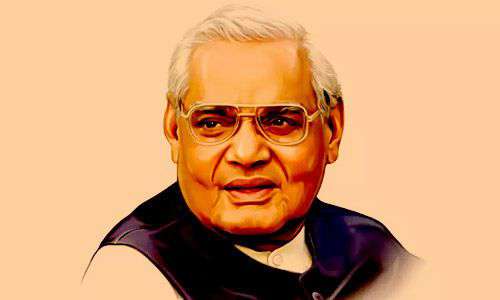Atal Jayanti: The Poet-Prime Minister who will forever be in the heart of every Indian: Birthday Special

Atal Bihari Vajpayee was an Indian politician, statesman and a poet who served three terms as the Prime Minister. A member of the Bharatiya Janata Party (BJP), he was the first Indian prime minister who was not a member of the Indian National Congress party to have served a full five-year term in office.
Vajpayee was born to Krishna Devi and Krishna Bihari Vajpayee in a Brahmin family on 25 December 1924 in Gwalior.His father, Krishna Bihari Vajpayee, was a school teacher in his hometown. Vajpayee did his schooling at the Saraswati Shishu Mandir in Gwalior.
He spoke about his ‘lifechanging moment’ at a public rally on the 1996 Lok Sabha election trail. He said “But I learned a lesson that changed my life. I took a pledge I’d never rote-learn a speech. It was my first speech at AVM (Anglo Vernacular Middle) School,”.
In 1942, at the age of 16 years, Vajpayee became an active member of the Rashtriya Swayamsevak Sangh. In August 1942, he and his elder brother Prem were arrested for 24 days during the Quit India Movement.
In 1951, Vajpayee was seconded by the RSS, to work for the newly formed Bharatiya Jana Sangh, a Hindu right-wing political party associated with the RSS.
In 1954, Vajpayee was with Mukherjee when the latter went on a hunger strike in Kashmir to protest the perceived inferior treatment of non-Kashmiri Indian visitors to the state.
In the 1957 Indian general election, Vajpayee contested elections to the Lok Sabha, the lower house of Indian parliament. He lost to Raja Mahendra Pratap in Mathura, but was elected from Balrampur. In the Lok Sabha his oratorial skills so impressed Prime Minister Jawaharlal Nehru that he predicted that Vajpayee would someday become the Prime Minister of India.
Vajpayee served as the Minister of External Affairs, or foreign minister, in Desai’s cabinet. As foreign minister, Vajpayee became the first person in 1977 to deliver a speech to the United Nations General Assembly in Hindi.
Vajpayee was sworn in as the 10th Prime Minister of India, but the BJP failed to muster a majority among members of the Lok Sabha. Vajpayee resigned after 16 days when it became clear that he did not have enough support to form a government.
In the 1999 general elections, the BJP-led NDA won 303 seats out of the 543 seats in the Lok Sabha, in the aftermath of the Kargil operations, thereby securing a comfortable and stable majority. On 13 October 1999, Vajpayee took oath as Prime Minister of India for the third time.
In 2012, Vajpayee was ranked number 9 in Outlook India’s poll of the Greatest Indian.
In 2015, Vajpayee was honoured with Bharat Ratna Award
In August 2018, Naya Raipur was renamed as Atal Nagar.
In October 2018, four Himalayan peaks near Gangotri glacier named after his name
On 11 June 2018, Vajpayee was admitted to AIIMS in critical condition following a kidney infection. He was officially declared dead there on 16 August 2018 at the age of 93.
